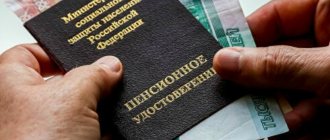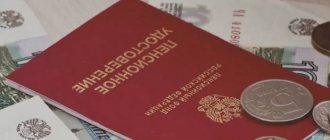( 10 ratings, average: 5.00 out of 5)
The possible suspension, termination and resumption of pension payments worries every third recipient of funds. Citizens who have retired, as well as disabled people who need to undergo periodic medical re-examination may face a similar situation.
- On what grounds are pension payments suspended?
- When does a complete cessation of pension payments occur?
- Terms of suspension of pension payments
- Guarantee of protection of unjustified termination and suspension of pensions
- Procedure for suspension and termination of pensions
- Terms of suspension and termination of pension payments
- Restoration of pension payments
- Conclusion
On what grounds are pension payments suspended?
Current legislation provides for two situations in which a temporary suspension of pension payments occurs:
- Failure to receive funds by a pensioner within six months.
- Refusal or failure to appear for medical re-examination.
Citizens who have retired, in the process of applying for pension payments, choose the method of receiving funds. They can provide a bank account, in which case, when transferring money, it will be considered that it has been paid to the recipient. The pensioner does not have to withdraw them from the account; he can keep them for several years and use them at his own discretion. Despite the ease of opening bank accounts and receiving pensions through them, many citizens prefer to use the classic method - through a postman or other organization that delivers funds. If a pensioner has not received payments in hand for more than 6 months, they are automatically suspended until the circumstances are clarified. Citizens recognized as disabled also receive pension payments. At the same time, their age does not matter; funds can be issued even for a child. The main thing here is the presence of disabled status, assigned by passing the ITU. Some disability groups require extension, i.e. re-passing the commission.
If a citizen does not appear on time for re-examination, pension payments will be temporarily suspended.
The timing of the re-examination must be indicated in the documents held by the disabled person. A citizen should prepare in advance for this procedure, since it affects his interests. If you do not pass the ITU on time, pension payments will be suspended. Foreign citizens also have the opportunity to receive a pension in the Russian Federation, subject to obtaining a residence permit. If its validity period comes to an end, payments are suspended.
Suspension of disability pension payments
The territorial PFRF keeps records of all pensioners receiving a disability pension. The automated system monitors the timing of payments and the timeliness of examination of disabled people.
When is a disability pension suspended?
The basis for suspending payment of such pensions may be the failure of a disabled person to appear at the federal institution of medical and social examination (MSE) for re-examination on time.
Payments are suspended for 3 months. The suspension begins on the 1st day of the month following the month in which the validity period of the extract from the certificate of examination of a citizen recognized as disabled expired.
Example: Kuzma Yablokov is 37 years old. In 2020, as a result of an accident, he was injured and was diagnosed with Group III disability until April 29, 2020. Kuzma Yablokov was supposed to come for the next examination on February 15, 2020. But he and his comrades spent the entire month washing away their problems. He did not appear at the commission. He didn’t call, didn’t think to submit an application asking to reschedule the examination date, and didn’t warn me that he wouldn’t come. From March 1, 2020, Kuzma Yablokov’s pension payment was suspended.
It is considered that disabled pensioners who applied to a medical and social examination institution before the end of the previous examination and submitted the necessary documents passed the examination on time.
Valid and disrespectful reasons for not attending a medical and social examination
The validity or irrelevance of the reasons for which untimely re-examination is allowed is determined by the federal institution ITU.
Among the valid reasons is health, which does not allow the pensioner to personally come to the medical and social examination institution; it is allowed to conduct the examination in the hospital where the pensioner is being treated, or at home.
In order for a disabled person not to miss the next re-examination deadline, it is enough to periodically review the documents confirming the disability. They always indicate the date of the next ITU, or it is written about.
How to resume payment of a disability pension
To resume disability payments, a pensioner must undergo a medical and social examination.
An extract from the ITU examination report confirming the pensioner’s disability makes it possible to eliminate the circumstances that led to the suspension of payments if it is sent to the Pension Fund of the Russian Federation.
If a person, before the expiration of 3 months, has undergone re-examination at a medical and social examination institution and his disability is confirmed, then payment of the fixed part of the disability insurance pension in an increased amount is resumed from the day on which the pensioner is again recognized as disabled. In this case, you do not need to submit an application.
If the period for re-examination is missed for a good reason, and the examination has established a disability group for the past, payment is resumed from the day on which the person is again recognized as disabled, regardless of how much time has passed since the suspension of the disability pension. If a different disability group is established, payments are resumed for the specified time according to the previous disability group.
If, during the period of suspension of payments, circumstances occurred that resulted in a decrease or increase in the amount of the pension, then recalculation will be made starting from the 1st day of the month following the month in which these circumstances occurred.
Otherwise, the renewal of disability pension payments occurs in the same way as in the case of old-age pension payments.
When does a complete cessation of pension payments occur?
There are situations in which pension payments are stopped completely.
These include:
- Death of the pension recipient.
- Removal of disability.
- The recipient of a survivor's pension reaches 18 years of age or stops studying full-time.
- A citizen leaves the country and obtains foreign citizenship with which the Russian Federation has not concluded an agreement.
In these situations, the pension can be suspended automatically, as soon as the event has occurred, or at the request of the recipient of the payments or his relatives.
In the event of the death of a pensioner, his relatives must provide to the Pension Fund:
- Death certificate.
- Certificate from the registry office about death.
- A court decision declaring a pensioner missing or dead.
- Other documents from government organizations certifying the death of a pensioner.
The PF is obliged to request confirmation of the information provided from the registry office and other government organizations. Only after this will pension payments be completely stopped. The need to conduct an audit helps protect citizens from illegal actions and preserve their legal right to receive a pension. If a previously assigned disability group has been removed from a citizen, he completely loses the right to receive pension payments, since he is recognized as capable and can get a job. After some time, the citizen will be able to try again to pass the ITU; if the result is positive and he is again assigned a certain disability group, he will be able to submit documents for payment of a new pension.
Termination of the survivor's pension occurs automatically when the child reaches the age of 18. However, a citizen has the right to extend payments up to 23 years of age, subject to full-time study.
If he is expelled, goes into the army, goes on maternity leave, or graduates from an educational institution, payments should be stopped. Only citizens have the right to receive a pension in the Russian Federation. Therefore, if a pensioner travels abroad and receives new citizenship, all payments stop. The only exceptions are countries with which the Russian Federation has concluded a corresponding agreement. In this case, the citizen must notify government services about the change of residence, but pension payments will not be terminated.
Termination of insurance pension payment
Termination of pension payment is the final interruption of the pension payment process, which is associated with the emergence of circumstances in which the right to receive payments is lost. If certain reasons arise, the payment of pensions may be suspended, and after those are excluded, they may be resumed. But there are situations when the payment of all possible types of pension can be rightly terminated.
The decision on termination is made by the bodies of the Pension Fund of Russia in connection with circumstances caused by the inaction of a citizen, or in other cases justified by the legislation of the Russian Federation.
Article 25 of the Federal Law of December 28, 2013 No. 400-FZ “On Insurance Pensions” provides for and regulates the procedures for terminating and restoring the payment of an insurance pension. Similarly in Art. 22 of the Labor Pensions Act 2001 regulated the termination and restoration of the payment of labor pensions. It should be noted that Art. 12 of the 2014 Law on funded pension[21] contains similar parts of the provisions of the commented article on the termination and restoration of payment of funded pension. With regard to the filing by the insured person of an application for the restoration of the payment of a funded pension, the insurer’s consideration of the said application, verification of the accuracy of the documents necessary to restore the payment of a funded pension, making a decision to restore the payment of a funded pension or to refuse to satisfy the application of the insured person for the restoration of payment of a funded pension. 6 of the said Art. 12 of the 2014 Law on funded pensions refers to the Law “On Insurance Pensions”, i.e. to the provisions of Parts 9 - 12 of Article 25.
So, Part 1 of Article 25 establishes the grounds for terminating the payment of an insurance pension and determines the deadlines for terminating such payment.
Thus, Part 1 of Article 25 of the Law “On Insurance Pensions” provides five grounds for termination of payment of an insurance pension.
The first of these grounds is the death of a pensioner or declaring him dead in accordance with the procedure established by the legislation of the Russian Federation or declaring him missing.
The document confirming the death of a pensioner is a death certificate. In accordance with Federal Law of November 15, 1997 No. 143-FZ “On Acts of Civil Status”[22], the death certificate contains the following information: last name, first name, patronymic, date and place of birth, citizenship, date and place of death of the deceased; date of compilation and record number of the death certificate; place of state registration of death (name of the civil registry office that carried out the state registration of death); date of issue of the death certificate.
Article 6 of the Federal Law “On individual (personalized) accounting in the compulsory pension insurance system”[23] establishes that in the event of the death of an insured person, information about his death is transferred within one month from the date of registration of death by the relevant civil registry office to that Pension Authority fund of the Russian Federation, where the state authority of the constituent entity of the Russian Federation, which formed the civil registration body, is registered as an insurer. The specified information is transmitted in form ADV-8, established by Resolution of the Board of the Pension Fund of the Russian Federation dated January 11, 2017 No. 2p “On approval of document forms used for registering citizens in the compulsory pension insurance system, and Instructions for filling them out”[24].
In accordance with Art. 42 of the Civil Code of the Russian Federation[25], a citizen may, at the request of interested parties, be recognized by the court as missing if within a year there is no information about his place of residence at his place of residence. If it is impossible to determine the day of receipt of the latest information about the missing person, the beginning of the calculation of the period for recognizing an unknown absence is considered to be the first day of the month following the one in which the last information about the absent person was received, and if it is impossible to determine this month, the first day of January of the next year.
Also Art. 45 of the Civil Code of the Russian Federation establishes that a citizen can be declared dead by a court if at his place of residence there is no information about his place of stay for five years, and if he went missing under circumstances that threatened death or give reason to assume his death from a certain accident , - within six months. A serviceman or other citizen who has gone missing in connection with hostilities may be declared dead by a court no earlier than two years from the date of the end of hostilities. The day of death of a citizen declared dead is the day the court decision to declare him dead comes into force. If a citizen who has gone missing under circumstances threatening death or giving reason to assume his death from a certain accident is declared dead, the court may recognize the day of death of this citizen as the day of his alleged death.
The procedure for a court to make decisions on declaring a citizen missing or declaring a citizen dead is regulated by Chapter. 30 Code of Civil Procedure of the Russian Federation[26].
If a citizen is recognized as missing or deceased in accordance with the established procedure, the basis for termination of the payment of a labor pension is a court decision that has entered into legal force, which is also sent by the judicial authorities within a month to the territorial body of the Pension Fund of the Russian Federation[27].
Payment of the insurance pension stops on the 1st day of the month following the month in which the pensioner’s death occurred or a court decision declaring him dead or declaring him missing came into legal force. If the relevant court decision indicates the date of declaring a citizen dead or recognizing him as missing, the period for termination of pension payment is determined based on the specified date.
So, if the death of a pensioner occurred on January 15, 2020, the payment of the insurance pension will be stopped on February 1, 2020. If a specific date is specified in the court decision to declare a citizen dead or recognize him as missing, then the payment of the insurance pension will be stopped accordingly from the 1st the month following the month in which the date of declaring the citizen dead or missing is determined.
According to Part 1 of Art. 209 of the Code of Civil Procedure of the Russian Federation, court decisions come into force after the expiration of the period for appeal, if they have not been appealed. It is also established there that if an appeal is filed, the court decision comes into force after the court considers this complaint, unless the appealed court decision is cancelled; if, by a ruling of the appellate court, the decision of the first instance court is canceled or changed and a new decision is made, it enters into legal force immediately;
The second basis for terminating the payment of an insurance pension is the expiration of six months from the date of suspension of the payment of the insurance pension due to:
- with the pensioner’s failure to receive the established insurance pension for six months in a row:
- with the person receiving the survivor’s insurance pension reaching the age of 18 and the absence of documents confirming his full-time education in an organization that carries out educational activities in basic educational programs, or the expiration of the training period for the recipient of the survivor’s insurance pension after reaching the age of 18, confirmed by a document from the specified organization;
- with the receipt of documents on the departure of a pensioner for permanent residence outside the territory of the Russian Federation to a foreign state with which the Russian Federation has concluded an international agreement, according to which obligations for pension provision are borne by the state in whose territory the pensioner lives, and the absence of documents confirming that the pensioner does not has the right to a pension in the territory of the specified state;
- with the receipt of documents on the pensioner’s departure for permanent residence outside the territory of the Russian Federation to a foreign state with which the Russian Federation has not concluded an international treaty, and the absence of an application from the pensioner for departure outside the territory of the Russian Federation.
In these cases, the payment of the pension is considered terminated from the 1st day of the month following the month in which the specified six-month period expired.
For example, the payment of an insurance pension was suspended from January 15, 2020 due to the pensioner’s failure to receive the established insurance pension for six consecutive months. The six-month period during which the payment of the insurance pension was suspended expired on July 15, 2020. Consequently, the decision to terminate the payment of the insurance pension will be made from August 1, 2018.
Previously in sub. 2 p. 1 art. 22 of the 2001 Law on Labor Pensions[28] spoke about the termination of the payment of a labor pension in the event of the expiration of six months from the date of suspension of the payment of a labor pension (part of the old-age labor pension) only in accordance with subsection. 1 clause 1 art. 21 of this Law, i.e. in case of failure to receive the established labor pension (part of the old-age labor pension) for six consecutive months. Clauses 3, 5 and 6 of Part 1 of Art. 24 of the Law “On Insurance Pensions”, specified in the paragraph under consideration, are innovations of this Law[29].
The third reason for termination of payment of an insurance pension is the loss of the pensioner’s right to the insurance pension assigned to him.
It is directly stated that we are talking about such cases as:
- if circumstances or documents have been discovered that refute the accuracy of the information presented in confirmation of the right to an insurance pension;
- if the period for recognizing a person as disabled has expired, if as a result of the next examination at a federal medical and social examination institution, the disability of this citizen was removed;
- if a person receiving an insurance pension in the event of the loss of a breadwinner has acquired the ability to work, including the child of the deceased breadwinner has reached 18 years of age or 23 years of age when studying full-time in an organization that carries out educational activities in basic educational programs, when changing the form of education from full-time to part-time or part-time;
- if one of the parents or spouse or grandfather, grandmother of the deceased breadwinner, as well as a brother, sister or child of the deceased breadwinner who has reached the age of 18, caring for children, brothers, sisters or grandchildren of the deceased breadwinner who have not reached 14 years of age, went to work or resumed other activities to be included in the insurance period;
- in other cases of loss of the right to an insurance pension provided for by the legislation of the Russian Federation[30].
The paragraph in question reproduces the provisions of sub-clause. 1 clause 1 art. 22 of the Labor Pensions Act 2001.
In all of these cases, the payment of the insurance pension is terminated on the 1st day of the month following the month in which the specified circumstances or documents were discovered, or the period of disability expired, or the person concerned became unable to work.
The fourth reason for termination of payment of an insurance pension is the failure of a pensioner - a foreign citizen or stateless person - to provide a residence permit.
Failure of a pensioner - a foreign citizen or a stateless person to provide a residence permit. This paragraph contains an innovation that takes into account those established in Part 3 of Art. 4 of the Law “On Insurance Pensions”, the specifics of acquiring the right to an insurance pension by a foreign citizen or stateless person.
Payment of the insurance pension in this case stops on the 1st day of the month in which the six-month period for which the payment of the pension was previously suspended expired.
The fifth reason for termination of payment of an insurance pension is the refusal of the pensioner to receive it.
This paragraph reproduces in the relevant part the provisions of paragraph 4 of Art. 22 of the Labor Pensions Act 2001.
Payment of the insurance pension stops on the 1st day of the month following the month in which the body providing pension provision received the corresponding application from the pensioner.
In addition, the legislator separately provides three grounds for terminating the payment of a disability insurance pension, and also determines the deadline for terminating such payment. Part 2 of Article 25 of the Law “On Insurance Pensions” reproduces the provisions of paragraph 2 of Art. 22 of the 2001 Law on Labor Pensions (as amended by Federal Law No. 213-FZ of July 24, 2009), which provided additional grounds for termination of payment of a labor pension for disability, but these provisions have undergone changes, as discussed in more detail below.
Thus, the payment of a disability insurance pension stops when a disabled person reaches the generally established retirement age (for men 60 years, for women - 55 years), necessary for the assignment of an old-age insurance pension, if he has 15 years of insurance experience and an individual pension coefficient of at least 30. Payment of the disability insurance pension in this case stops on the 1st day of the month following the month in which the pensioner reached the age for receiving an old-age insurance pension. In this case, the amount of the disability insurance pension for the period from the day the pensioner reaches the specified age is taken into account when paying the assigned old-age insurance pension.
Previously sub. 2 p. 2 art. 22 of the 2001 Law on Labor Pensions in accordance with the provisions of Art. 7 of this Law provided that the payment of a labor disability pension ceases from the day of reaching the age for the assignment of an old-age labor pension, provided for in paragraph 1 of Art. 7 of the Law “On Insurance Pensions”, with five years of insurance experience.
Also, the payment of a disability insurance pension stops when the pensioner reaches the age required to receive a social old-age pension.
In accordance with Art. 11 of the Federal Law “On State Pension Provision in the Russian Federation”[31] men upon reaching the age of 65 and women upon reaching 60 have the right to a social old-age pension. Naturally, in this case we are talking about persons who do not have 15 years of insurance experience and the value of the individual pension coefficient is less than 30. Payment of a social disability pension in this case stops on the 1st day of the month following the month in which the pensioner has reached the age required to receive a social old-age pension.
Previously in sub. 3 p. 2 art. 22 of the 2001 Law on Labor Pensions established that the payment of a labor disability pension ceases from the day of reaching the specified age for the assignment of a social old-age pension.
In addition, the payment of the disability insurance pension is terminated from the day on which the old-age insurance pension is established, assigned ahead of schedule, if there are grounds provided for in Art. 30 - 34 of the Law “On Insurance Pensions”, as well as paragraphs 2 and 3 of Art. 32 of the Law of the Russian Federation “On Employment in the Russian Federation”[32] and Art. 30 - 37 of the Law of the Russian Federation “On the social protection of citizens exposed to radiation as a result of the disaster at the Chernobyl nuclear power plant”[33].
Previously sub. 1 item 2 art. 22 of the 2001 Law on Labor Pensions provided that the payment of a labor disability pension ceases from the day on which an early labor old-age pension is established.
2.3 Restoration of insurance pension payment
Article 25 of the Law “On Insurance Pensions” establishes the grounds for restoring the payment of the insurance pension and determines the time frame for restoring such payment. Previously, such regulation was provided for by the provisions of paragraphs 3 and 4 of Art. 22 of the 2001 Law on Labor Pensions (as amended by Federal Law No. 227-FZ of July 27, 2010).
Article 25 of the Law “On Insurance Pensions” provides for three conditions under which the payment of an insurance pension is restored, the first of which is the cancellation of a court decision to declare the pensioner dead or to recognize the pensioner as missing. In accordance with Art. 280 of the Code of Civil Procedure of the Russian Federation, in the event of the appearance or discovery of the place of residence of a citizen recognized as missing or declared dead, the court with a new decision cancels its previously adopted decision. The new court decision is, accordingly, the basis for canceling the management of the citizen’s property and for canceling the death record in the state civil registration book.
Payment of the insurance pension is restored from the 1st day of the month following the month in which the court decision entered into legal force. As mentioned above, in accordance with Part 1 of Art. 209 of the Code of Civil Procedure of the Russian Federation, court decisions come into force after the expiration of the period for appeal, if they have not been appealed. It is also established there that if an appeal is filed, the court decision comes into force after the court considers this complaint, unless the appealed court decision is cancelled; If, by a ruling of the appellate court, the decision of the first instance court is canceled or changed and a new decision is made, it enters into legal force immediately.
The second condition for the restoration of the payment of an insurance pension, provided for in the commented article, is the occurrence of new circumstances or proper confirmation of previous circumstances that give the right to establish an insurance pension. In this case, the law establishes a temporary restriction, namely that the restoration of the payment of an insurance pension on the specified basis can only take place if no more than 10 years have passed since the termination of payment. To restore the payment of an insurance pension on this basis, the desire of the pensioner is required, which must be expressed in an application with which the citizen applies to the territorial body of the Pension Fund of the Russian Federation at the location of his pension file. The restoration of the payment of the insurance pension on the specified basis is carried out from the 1st day of the month following the month in which the territorial body of the Pension Fund of the Russian Federation received the corresponding application for the restoration of the payment of this pension and all the necessary documents, the obligation to submit which is assigned to the applicant[34].
The third condition for the restoration of the payment of the insurance pension is the pensioner’s application for the restoration of the payment of the insurance pension after refusing to receive it on the basis of clause 5 of part 1 of this article (this clause reproduces the provisions of clause 4 of Article 22 of the 2001 Law on Labor Pensions) .
Payment of the insurance pension is restored from the 1st day of the month following the month in which the pension provider received the corresponding application from the pensioner. In this case, unlike the previous paragraph, there is no mention of the need to submit the necessary documents, the obligation to submit which is assigned to the applicant.
When the body of the Pension Fund of the Russian Federation makes a decision to restore the payment of an insurance pension, the right to receive a pension is not revised, and its amount is determined anew in accordance with Art. 15 of the commented Law. If, upon restoration of the payment of the insurance pension, its amount does not reach the amount of the insurance pension established on the day of termination of payment of the specified insurance pension, the pensioner is restored to the insurance pension in the previous, higher amount.
Pensioners should pay attention to the fact that in some cases, instead of applying for the restoration of payment of an insurance pension, it is advisable to apply for its new purpose, since, firstly, when applying for the restoration of a pension, the grace period of three months established for additional collection and submission of missing documents is by law is not provided and, secondly, when a pension is newly assigned, different dates for the start of its payment are established. The insurance pension is assigned from the date of application for the specified pension. The restoration of the payment of the insurance pension is carried out from the 1st day of the month following the month in which the territorial body of the Pension Fund of the Russian Federation received an application for the restoration of the payment of the insurance pension and all the necessary documents.
In the event that the payment of an old-age insurance pension was terminated due to the pensioner’s application for refusal to receive it, when restoring payment or when assigning a new insurance pension, the sum of individual pension coefficients and coefficients for other periods counted in the insurance period that occurred is taken into account before the appointment of an insurance pension for the first time, for periods after the appointment of an insurance pension for the first time, for which payment of the specified pension or other pension or monthly lifelong maintenance provided for by the legislation of the Russian Federation was not carried out, but not earlier than January 1, 2020. This procedure does not apply to citizens entitled to receive several types of pension benefits.[35]
Regardless of the period for which the insurance pension is assigned, if the document issued to a foreign citizen or stateless person confirming his right to permanent residence in the Russian Federation (residence permit) expires, payment of the insurance pension is suspended in the manner prescribed by paragraph 4 Part 1 of Article 24 of Law No. 400-FZ, that is, for six months starting from the 1st day of the month following the month in which the specified document expired. Thus, pension legal relations are suspended. In the future, if a foreign pensioner or stateless person fails to provide a residence permit, from the 1st day of the month in which the specified six-month period expires, the payment of the insurance pension and, therefore, the pension legal relationship is terminated. If the interested person has submitted a residence permit in a timely manner, then the pension legal relationship is resumed without any financial damage to him. Moreover, according to Part 7 of Article 25 of Law No. 400-FZ, when a person applies, the payment of an insurance pension to whom was terminated on the basis in question, if he has the right to a pension in the period after the termination of payment of this pension before the application, the decision to terminate the payment of the insurance pension is canceled , and the amounts of the insurance pension are paid for the past time, but not more than for three years preceding the month following the month of application. In other words, if a residence permit is submitted later, and the information contained in it confirms the right to a pension for the named period, then legal relations during this time can also essentially be classified as suspended rather than terminated. It should be borne in mind that, in accordance with paragraph 3 of Article 8 of the Federal Law of July 25, 2002 No. 115-FZ “On the Legal Status of Foreign Citizens in the Russian Federation,” a residence permit is issued to a foreign citizen for five years. Upon expiration of the residence permit, this period, upon application of a foreign citizen submitted to the territorial body of the federal executive body in the field of migration no later than two months before the expiration of his residence permit, can be extended for five years. The number of extensions of the residence permit is not limited[36].
If the payment of the insurance pension was terminated due to the cancellation of a court decision declaring a citizen dead or recognizing the citizen as missing, due to the expiration of a six-month period on the grounds provided for in clause 2, part 1, article 25 of the Law “On Insurance Pensions”, as well as in connection with the failure of a pensioner - a foreign citizen or a stateless person to provide a residence permit and after the termination of payment of the pension, the right to it was lost, the restoration of the payment of the insurance pension is carried out in the manner established by Part 3 of Article 25 of the Law “On Insurance Pensions”, or new assignment of insurance pension[37].
Further, the Law “On Insurance Pensions” regulates the submission by a pensioner of an application for the restoration of the payment of an insurance pension, the consideration by the body providing pension provision of the said application, verification of the authenticity of the documents necessary for the restoration of payment of the insurance pension, the adoption of a decision on the restoration of payment of the insurance pension or refusal to satisfy applications for restoration of payment of an insurance pension (as mentioned above, these provisions are referred to in Part 6 of Article 12 of the 2014 Law on Funded Pension). These provisions are innovations of the Law “On Insurance Pensions”, since in the above-mentioned Art. 22 of the 2001 Law on Labor Pensions, which regulated the termination and restoration of the payment of labor pensions, did not resolve such issues.
In all cases, in order to restore the payment of the insurance pension, an application from the pensioner is required and the submission of all documents necessary for the restoration of the payment, the obligation to submit which is assigned to the applicant.
When accepting an application, employees of the territorial body of the Pension Fund of the Russian Federation explain to the pensioner what documents he is obliged to submit, as well as which documents from among those at the disposal of other state bodies, local government bodies or organizations subordinate to state bodies or local government bodies he has the right to submit on his own initiative.
The Law “On Insurance Pensions” determines the time frame for consideration by the body providing pension provision of an application for the restoration of payment of an insurance pension.
A general rule has been established according to which such an application is considered no later than five working days. This period is calculated either from the date of receipt of the application with all the necessary documents to be submitted by the applicant, which he has the right to submit on his own initiative, or from the date of receipt of documents requested by the body providing pensions, other state bodies, local government bodies or subordinate state bodies or local government organizations[38].
If there is a need to verify the accuracy of received documents necessary to restore the payment of an insurance pension, or in the event of failure by state bodies, local government bodies or organizations subordinate to state bodies or local government bodies to submit documents within the established period, the body of the Pension Fund of the Russian Federation has the right to suspend the period for consideration of the application until the completion of the inspection, submission of documents requested from the specified bodies and organizations, but not more than three months.
In case of refusal to satisfy an application for restoration of payment of an insurance pension, the body providing pension provision is obliged to notify the applicant of the decision, indicating the reason for the refusal and the procedure for appeal, and to return all documents submitted by the applicant. This obligation must be fulfilled no later than five working days from the date of the said decision. The procedure for appealing and challenging decisions of territorial bodies of the Pension Fund is regulated by Art. 21 of the Law “On Insurance Pensions”.
Conclusion
Due to the difficult economic situation in the country, rising inflation, and declining budget revenues at all levels, the Government of the Russian Federation is looking for ways to reduce and optimize budget expenditures, including those related to pension provision for Russian citizens.
One of these possible measures is the suspension of pension payments to those pensioners who, after retirement, continue to work, receiving appropriate remuneration for their work. In order to implement this idea, the Russian Ministry of Labor has prepared a draft Federal Law “On the Peculiarities of Payment of Pensions to Working Pensioners.”
According to the draft law, payment of an insurance pension, including taking into account the fixed payment to the insurance pension and increases in this fixed payment established in accordance with the law for pensioners carrying out work and (or) other activities during which they are subject to compulsory pension insurance, is carried out, if the total amount of payments and other remuneration accrued in favor of an individual does not exceed 1 million rubles.
The Russian Ministry of Labor calculated that we do not have many “highly paid” pensioners - about 220 thousand people[39]. At the same time, the expert community has expressed concerns that the suspension of pension payments to working pensioners will create conditions for “earnings to go into the shadows.” Thus, economist Y. Markin believes: “As a rule, people over 55-60 years old who receive a salary of this level are especially valuable specialists who are held on to. They will immediately begin to receive their salaries in an envelope. Any way to make their income less than a million rubles.” And this, in turn, will entail a reduction in the amount of income tax and insurance contributions to extra-budgetary funds.
Of course, these risks of the innovation under consideration must be taken into account when making a final decision on the bill.
Payment of insurance pensions to working citizens will be carried out without taking into account the amounts of indexations (increases) that took place during the period of their labor and (or) other activities. Here one can argue for a long time to what extent such a decision of the legislator corresponds to the constitutional principles of pension provision, the legal nature of the insurance pension, whether there are socio-economic conditions for limiting the payment of a pension during work at the present time, etc.
It is clear that different specialists may have diametrically opposed positions in such a dispute. By the way, Article 26 of the 1952 ILO Convention “On Minimum Standards of Social Security”, the issue of ratification of the provisions of which is being considered by the Russian government authorities, establishes that state legislation may provide for the suspension of the issuance of benefits to persons entitled to it, but engaged in any established income-generating activities; There may also be a reduction in benefits under a contributory system when the recipient's earnings exceed a specified amount, or under a non-contributory system when the recipient's earnings, other assets, or a combination thereof, exceed a specified amount. Thus, international social security law provides for the possibility of introducing restrictions on the payment of pensions to working pensioners. In our case, we are not talking about suspending the payment of pensions in full, but a part of it, the amount of which is actually made dependent on the number of years of work by citizens after the pension was assigned.
The main advantage of the pension reform, launched in 2020, is that the new provisions of the pension legislation, according to their authors, will help balance the Pension Fund budget .
Its balance consists in saving financial resources of the state budget, directed to the pension budget to finance state pension programs and making additional payments to those pensioners whose pension amount was lower than the subsistence level established in the region of residence.
Currently, the inefficiency of the current pension system is becoming obvious, and the reforms launched in 2020 are not bringing the expected results. The Government is discussing proposals from the economic bloc regarding further reform of the pension system.
The government has already adopted and continues to discuss a number of new measures that could eliminate the lack of funds necessary to ensure the operation of the pension system. No documented decisions have yet been made, but the state of the financial, economic and social sphere leaves no doubt that serious changes await the pension system in the near future.
In Russia, currently, the number of pensioners is about 30% of the population and against the backdrop of crisis trends in the economy and rising unemployment, raising the retirement age becomes inevitable.
· From January 1, 2020, the retirement age for civil servants has increased by 6 months annually until it reaches 65 years. Somewhat later, such a measure awaits all other citizens of the Russian Federation.
· There is a discussion of further reduction of pension indexation, and for working pensioners its abolition, if not complete, then at least PV.
· The Ministry of Finance proposes to transfer the functions of collecting pension contributions to the Federal Tax Service and to establish a unified social insurance tariff with the abolition of the maximum size of the insurance base.
· The funded pension, on the formation of which there is a moratorium for three years, is proposed to be formed by direct transfer of contributions to the savings accounts of management companies and non-state pension funds, bypassing the Pension Fund.
Pension reforms will also touch upon the issues of suspension, termination, and restoration of the payment of insurance pensions.
Terms of suspension of pension payments
There are the following periods for suspension of pension payments:
- 6 months – the pensioner has not received funds for six months.
- 3 months – the citizen did not appear for re-examination.
- 6 months – suspension of a survivor’s pension when the recipient cannot provide evidence of full-time study.
- 6 months – expiration of residence permit.
During the specified period, the citizen will be able to provide all the documents necessary to restore his pension to the Pension Fund, and the funds for the previous months will be returned to him in full.
Rules
Insurance pension payments are made according to general rules:
- Payment of accruals is carried out for the current month by the territorial body of the Pension Fund at the location of the pension department on the basis of an application drawn up by the pensioner.
- In order for a citizen to receive insurance payments, a personal account is opened and maintained for him in electronic form.
- Pension payments to convicted persons are made at the place where the sentence is served. According to Article 107 of the Criminal Executive Code of the Russian Federation, in correctional colonies, at least 25% of the pension accrued to them is credited to the personal account of convicted persons.
- If the citizen wishes, the insurance payment can be made by proxy.
It is issued in the manner established by the legislation of the Russian Federation. You can receive an insurance pension under a power of attorney, if its validity period exceeds a year, during the entire period of validity of the power of attorney. On a note! Moreover, every year the recipient must confirm the fact of his registration at the place of receipt of the payment. - If the beneficiary has died, then the rest of the amount should be received by his family members who lived with the deceased on the day of his death.
Guarantee of protection of unjustified termination and suspension of pensions
The Pension Fund cannot terminate or suspend pension payments on illegal grounds or due to speculation.
To avoid creating erroneous situations, his powers include:
- Keeping strict records of pensioners whose payments have been suspended or terminated.
- Assistance to citizens in the full restoration of previously suspended payments, regardless of the reason.
- Advance notification of the citizen about the need to re-submit documents to receive payments, as well as sending out notifications about the suspension or termination of the pension.
- A detailed clarification of the reasons for the pensioner’s non-receipt of payments for six months.
- Interaction with government agencies in order to carry out medical examination as quickly as possible and provide documents for receiving a pension.
Thus, before suspending or terminating a pension, PF employees are required to conduct a small check of the information received for accuracy.
How to suspend and resume pension payments
The restoration of the required transfers occurs on the basis of the publication of a new order by the Pension Fund of Russia. To do this you need:
- The citizen ceases to receive funds in the manner established upon his application. The account accumulates the amount for six months.
- The residence permit of a foreigner or a stateless person has expired, and a new one has not been issued (or not provided to the Pension Fund).
- The recipient left the country for permanent residence and did not inform the sender of the money about this fact on his own initiative.
Procedure for suspension and termination of pensions
The suspension and termination of a pension occurs according to the following algorithm:
- The Pension Fund receives information about the occurrence of a situation requiring a temporary suspension of payments or their complete termination.
- The information received is studied in detail and checked for accuracy.
- Authorized PF employees decide to suspend or terminate payments.
- The order is prepared within one working day.
- The accrual of pensions is suspended and its payment is terminated.
As mentioned above, the initiator of termination (suspension) of a pension can be any government organization, the Pension Fund itself or the relatives of the pensioner. In the event that payments are terminated due to non-receipt within six months, the absence of the pensioner’s signature on the documents confirming the delivery of funds serves as evidence.
In what cases can the SCVP suspend the payment of pensions?
Every month the Center pays pensions and benefits in the amount of more than 117 billion tenge. There are often cases when transfers of benefits/pensions are made to recipients’ accounts in second-tier banks (hereinafter referred to as the bank) after they leave for permanent residence outside the country or after their death. That is, facts of overpayment arise when the relatives of the deceased recipient fail to timely contact the justice authorities to register the fact of death or in the absence of a message from the recipient about his upcoming departure from the country.
If the application is not received by the Center, but the bank provides information that there has been no movement of funds in the bank account of the pension/benefits recipient for three or more months, the Center employees, before suspending payments, are required to contact the recipient to establish the reason by phone , through sending a notification, calling to the State Center for Victims of Internal Affairs/visiting the place of residence of benefit/pension recipients, interviewing neighbors, etc.
Terms of suspension and termination of pension payments
The accrual of pension payments stops immediately after the discovery of a fact that speaks in favor of their suspension. However, payments will be completely abolished on the first day of the month following the reporting month. This means that a citizen can receive funds for the previous month, but not in full.
Example. Citizen Simonenko receives a survivor's pension. He turns 18 on January 20, 2020. Simonenko plans to get a job and study part-time, so extending payments until age 23 is impossible. In the month of February, the citizen will receive the last payment for 20 days of January.
Thus, when canceling payments, a citizen should not hope that he will receive money for a full calendar month. Only a portion of the funds will be given to him. In the event that an overpayment occurs, it is possible that the funds will need to be returned to the PF accounts. After the death of a pensioner, his last pension is received by close relatives. To do this, they must write an application and provide the necessary package of documents.
In what cases can pension payments be suspended or stopped?
Grounds for suspension of payment Pension payments are suspended for 6 months if: 1. The pensioner or his authorized representative has not received a pension for 6 months. Payments will stop on the 1st of the next (seventh) month. 2. The document confirming the right of permanent residence in Russia of a foreign citizen has expired. Payments will stop on the 1st day of the month following the month in which the validity period of the specified document expired. 3. The pensioner left for another country for permanent residence and did not provide documents confirming that he does not have the right to receive a pension in this country (if Russia has concluded an international agreement on pension provision for citizens with this state). Payments will stop on the 1st day of the month following the month in which the Pension Fund received the exit documents. 4. A pensioner leaves for permanent residence in another state without writing an application for leaving the territory of the Russian Federation (with which Russia does not have an international treaty). Payments will stop on the 1st day of the month following the month in which the PFRF received exit documents.
Restoration of pension payments
The restoration of the pension occurs after all the factors that led to its termination have been eliminated. At the same time, the citizen must be paid funds for all previous months. For this purpose, their recipient must contact the Pension Fund with an application and a complete package of documents.
It includes:
- Passport of a citizen of the Russian Federation.
- SNILS.
- Certificate from educational institution.
- ITU Conclusion.
The list of documents varies depending on the individual situation. If payments are made to a disabled child, it is necessary to provide the passport of his official representative (parent, guardian), the conclusion of the commission, SNILS of the minor and his birth certificate. Extension of a survivor's pension will require proof of full-time study. They can be a certificate from the educational institution and a copy of the contract. If payments were suspended due to untimely completion of the ITU, they are fully restored after a new conclusion is provided.
Payments can also be restored if:
- Cancellation of a court order declaring a pensioner missing or dead. Unfortunately, such situations do happen. After their occurrence, the pensioner has the right to demand payment of all funds due to him by law.
- The pensioner submits an application for payments, after they are canceled at his personal request. In rare situations, citizens refuse pension payments. This gives small privileges in the future, when calculating a pension at a later period. Payments can be restored at any time. However, funds for previous periods, in this case, are not returned.
After restoration, payments are subject to recalculation. This is due to the fact that during their suspension, new pension laws could be introduced or annual indexation carried out. If after recalculation the amount of payments turns out to be less than it was before they were suspended, it will be paid in the same amount.
Everything about registration, payment and delivery of pensions
Example. Pensioner K.'s disability was established until December 1, 2020. The date of the next examination is October 14, 2020. The pensioner did not show up for the examination, did not call, and the medical institution also did not receive an application requesting to reschedule the date. Payment of K.'s pension was suspended from December 1, 2020.
Example. Pensioner P. issued a power of attorney to his wife to receive his pension and went to visit relatives in Ukraine. He received his pension at home. On the day she received her next pension, the wife showed the delivery organization employee her passport and the power of attorney left to her by her husband. She was informed that the power of attorney was invalid because it did not have an issue date. Every month, the delivery organization worker continued to come to the address.










